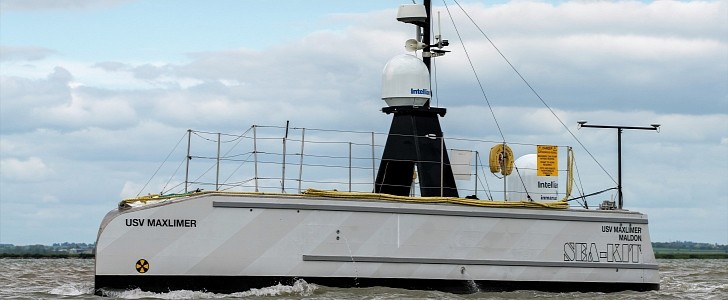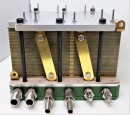Since autonomous technology and hydrogen fuel cell propulsion are two of the top trends in the automotive industry, it’s not surprising that new projects aim to bring them together – autonomous vehicles running on clean energy are what the future is all about. But it’s more impressive when it comes to the maritime industry, where the transition towards sustainability has been more challenging.
The UK is known for its rich maritime history and, now, it also wants to lead the way for a zero-emission, sustainable maritime industry. Through the recent Clean Maritime Demonstration Competition (CMDC), funded by the Department for Transport (DfT) and the InnovateUK agency, Sea-Kit International was selected to demonstrate hydrogen fuel cell technology for uncrewed surface vessels (USVs).
The project’s objective is to help achieve UK’s goal of cutting toxic emissions from shipping by at least 50%, until 2050.
Sea-Kit’s autonomous vessels were initially designed with a dual diesel-electric hybrid drive, with the batteries being charged by diesel generators. For this new project, one of these generators will be replaced with hydrogen fuel cell technology.
The fuel cell will be provided by West Sussex-based Bramble Energy, a company that specializes in printed circuit board fuel cell (PCBFC). What’s great about PCB, compared to metallic or graphite end plates, is that it’s more suitable for marine environments, which are more challenging.
Sea-Kit will retrofit its 12-meter (39 feet) ship, the Maxlimer, with the Bramble hydrogen fuel cell system. The following tests and sea trials will provide important information for making this technology available for larger autonomous ships. By converting them from diesel to hydrogen, Sea-Kit’s innovative ships would also become emissions-free, which is a great advancement in maritime technology.
Uncrewed ships of various sizes are already being used for different types of activities, from geophysical survey and off-shore inspections, to surveillance and coastal monitoring. If they can also be powered by clean energy, the maritime industry will truly get to the next level.
The project’s objective is to help achieve UK’s goal of cutting toxic emissions from shipping by at least 50%, until 2050.
Sea-Kit’s autonomous vessels were initially designed with a dual diesel-electric hybrid drive, with the batteries being charged by diesel generators. For this new project, one of these generators will be replaced with hydrogen fuel cell technology.
The fuel cell will be provided by West Sussex-based Bramble Energy, a company that specializes in printed circuit board fuel cell (PCBFC). What’s great about PCB, compared to metallic or graphite end plates, is that it’s more suitable for marine environments, which are more challenging.
Sea-Kit will retrofit its 12-meter (39 feet) ship, the Maxlimer, with the Bramble hydrogen fuel cell system. The following tests and sea trials will provide important information for making this technology available for larger autonomous ships. By converting them from diesel to hydrogen, Sea-Kit’s innovative ships would also become emissions-free, which is a great advancement in maritime technology.
Uncrewed ships of various sizes are already being used for different types of activities, from geophysical survey and off-shore inspections, to surveillance and coastal monitoring. If they can also be powered by clean energy, the maritime industry will truly get to the next level.






